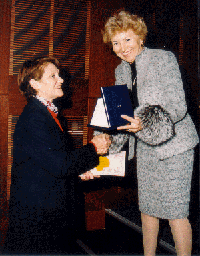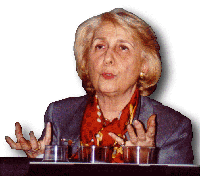da Leadership Medica n. 2 del 2001
 On 24 January Spazio Oberdan in Milan hosted an interesting conference marked by a desire for a distinct multidisciplinary approach. In the congress hall of the elegant cultural centre of Porta Venezia, experts alternated on the platform, from the world of science, the civil service, art, and so on, all concurring in stating that creativity and culture are possibly the only real elixir of life. Indeed, the idea for this conference originated in our editorial office, during a conversation between Prof. Sandra Giavelli - Consultant of the Pio Albergo Trivulzio Geriatric Institute and coordinator of the Zonta Club di Milano Sant’Ambrogio - and Genina Iacobone, editor of Leadership Medica and Leader for Chemist. Prof. Giavelli subsequently involved the Milan provincial authorities in the matter, and particularly the Personnel Councillorship, headed by Avv. Ada Grecchi, and L.I.T.A. [Free Institution for the Protection of the Elderly], headed by Avv. Daria Pesce. Genina Iacobone’s speech centred on the paradoxes of the language imposed, rather than suggested, by the new technologies, as a result of which the generation gap has widened. Our editor’s address aimed at revaluating traditional face-to-face communication, in a more human perspective, free from the unavoidable stress brought about by some of today’s ways of life. On the other hand, Prof. Sandra Giavelli optimistically underlined the changes taking place in our society.
On 24 January Spazio Oberdan in Milan hosted an interesting conference marked by a desire for a distinct multidisciplinary approach. In the congress hall of the elegant cultural centre of Porta Venezia, experts alternated on the platform, from the world of science, the civil service, art, and so on, all concurring in stating that creativity and culture are possibly the only real elixir of life. Indeed, the idea for this conference originated in our editorial office, during a conversation between Prof. Sandra Giavelli - Consultant of the Pio Albergo Trivulzio Geriatric Institute and coordinator of the Zonta Club di Milano Sant’Ambrogio - and Genina Iacobone, editor of Leadership Medica and Leader for Chemist. Prof. Giavelli subsequently involved the Milan provincial authorities in the matter, and particularly the Personnel Councillorship, headed by Avv. Ada Grecchi, and L.I.T.A. [Free Institution for the Protection of the Elderly], headed by Avv. Daria Pesce. Genina Iacobone’s speech centred on the paradoxes of the language imposed, rather than suggested, by the new technologies, as a result of which the generation gap has widened. Our editor’s address aimed at revaluating traditional face-to-face communication, in a more human perspective, free from the unavoidable stress brought about by some of today’s ways of life. On the other hand, Prof. Sandra Giavelli optimistically underlined the changes taking place in our society.  The long working experience at Pio Albergo Trivulzio has led the Milanese radiologist to the conviction that, particularly with the elderly, we can only truly appreciate a state of health when there is “a state of complete well-being, from a physical, social and mental point of view”. The birth of geriatrics as a scientific discipline has certainly represented a step forward in the study of the so-called “Third Age”, as it has improved our knowledge of individual pathologies and at the same time revalued elderly people’s unexpressed resources. In addition, as Prof. Giavelli pointed out, senior citizens represent a fair share of the market addressed by companies with their products; so elderly people, who exit the production cycle upon retirement, re-enter it as consumers. The recreational activities promoted by the Trivulzio Institute prove that also people who are well advanced in years, when stimulated from a creative point of view, may provide amazing responses. The basic issue is to regard culture, ever since childhood, as a value, and assign to it a constant (even though minimum) space in our life. The dialogue between generations, such as the grandparent-grandchildren relationship, is possibly losing significance, taking away quite a substantial share of our cultural heritage. The other contributions to the congress were numerous and interesting, brilliantly moderated by Giannino Fava, former Director of the Department of Medical Physics of the Milan Institute for Tumours and Vice-president of the Trivulzio Institute, who was very careful to seize the various opportunities for discussion. We were particularly impressed by the eloquence of a businessman such as Silvio Segre - who gave an extremely clear description of what we should mean by “entrepreneurial spirit” - and by the unchanged talent of the actress Eva Magni, who declaimed some verses with great emphasis. So we had two ninety-year-old people, who however do not represent an exception, in that the cases of longevity are becoming increasingly frequent even though not everyone has been lucky enough to achieve satisfaction and appreciation in his own field of activity.
The long working experience at Pio Albergo Trivulzio has led the Milanese radiologist to the conviction that, particularly with the elderly, we can only truly appreciate a state of health when there is “a state of complete well-being, from a physical, social and mental point of view”. The birth of geriatrics as a scientific discipline has certainly represented a step forward in the study of the so-called “Third Age”, as it has improved our knowledge of individual pathologies and at the same time revalued elderly people’s unexpressed resources. In addition, as Prof. Giavelli pointed out, senior citizens represent a fair share of the market addressed by companies with their products; so elderly people, who exit the production cycle upon retirement, re-enter it as consumers. The recreational activities promoted by the Trivulzio Institute prove that also people who are well advanced in years, when stimulated from a creative point of view, may provide amazing responses. The basic issue is to regard culture, ever since childhood, as a value, and assign to it a constant (even though minimum) space in our life. The dialogue between generations, such as the grandparent-grandchildren relationship, is possibly losing significance, taking away quite a substantial share of our cultural heritage. The other contributions to the congress were numerous and interesting, brilliantly moderated by Giannino Fava, former Director of the Department of Medical Physics of the Milan Institute for Tumours and Vice-president of the Trivulzio Institute, who was very careful to seize the various opportunities for discussion. We were particularly impressed by the eloquence of a businessman such as Silvio Segre - who gave an extremely clear description of what we should mean by “entrepreneurial spirit” - and by the unchanged talent of the actress Eva Magni, who declaimed some verses with great emphasis. So we had two ninety-year-old people, who however do not represent an exception, in that the cases of longevity are becoming increasingly frequent even though not everyone has been lucky enough to achieve satisfaction and appreciation in his own field of activity. In fact, the elderly population is constantly increasing and the problems it has to face are varied: family integration, sometimes subsistence, adaptation to the facilities for the elderly in which they are often obliged to live, and so on. Every argument is based on statistical data, since our country is among those with the lowest birth rate, a record that, strangely enough, we share with Spain, another cornerstone of Catholicism in Europe. Carlo Vergani - who holds the chair of Gerontology and Geriatrics at Milan University - stated that, according to the World Health Organisation, although Italy’s population stands out in terms of longevity, the quality of life of elderly people in this country is not all it could be. Only 30% of this can be accounted for by individual genetic factors, whereas the remaining 70% is a result of people’s lifestyle. Prof. Marcello Cesa Bianchi - who holds the chair of Psychology at Milan University - stressed that today’s lifestyle enables us to devote an ever decreasing amount of time to our own interests, whereas retirement offers us the opportunity to meet those personal requirements which our productive life has for a long time caused us to neglect. However, elderly people cannot be expected to achieve quality of life without autonomy, which can only be granted by an adequate social status and good health, as mentioned by Aldo Tammaro, Medical Director of the “Giuseppe Verdi” Rest Home for Musicians, whose guests have been awarded the prize “Una vita per...” [“A life devoted to...”].
In fact, the elderly population is constantly increasing and the problems it has to face are varied: family integration, sometimes subsistence, adaptation to the facilities for the elderly in which they are often obliged to live, and so on. Every argument is based on statistical data, since our country is among those with the lowest birth rate, a record that, strangely enough, we share with Spain, another cornerstone of Catholicism in Europe. Carlo Vergani - who holds the chair of Gerontology and Geriatrics at Milan University - stated that, according to the World Health Organisation, although Italy’s population stands out in terms of longevity, the quality of life of elderly people in this country is not all it could be. Only 30% of this can be accounted for by individual genetic factors, whereas the remaining 70% is a result of people’s lifestyle. Prof. Marcello Cesa Bianchi - who holds the chair of Psychology at Milan University - stressed that today’s lifestyle enables us to devote an ever decreasing amount of time to our own interests, whereas retirement offers us the opportunity to meet those personal requirements which our productive life has for a long time caused us to neglect. However, elderly people cannot be expected to achieve quality of life without autonomy, which can only be granted by an adequate social status and good health, as mentioned by Aldo Tammaro, Medical Director of the “Giuseppe Verdi” Rest Home for Musicians, whose guests have been awarded the prize “Una vita per...” [“A life devoted to...”].
La Redazione
(traduzione Interpres sas Giussano)



